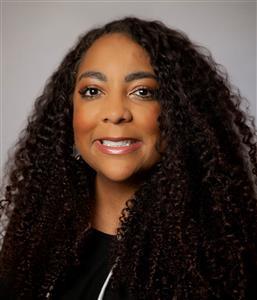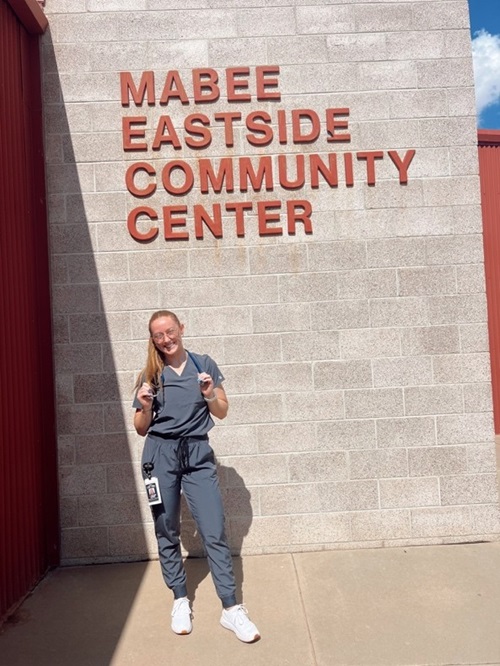Learning Through Service: PA Students Bring Health Care Education to the Community

The Physician Assistant (PA) program in the TTUHSC School of Health Professions has made community engagement a cornerstone of its curriculum. Through a required service learning initiative, students practice patient education while supporting vulnerable populations across West Texas.
What began as a small, volunteer-based effort has grown over the past five years into a program that touches multiple community organizations. Each semester, students participate in service learning activities designed to give back to the community while strengthening their own clinical skills. “It’s giving back to the community, but it is also helping students grow as practitioners, giving them earlier immersion into seeing a patient than they might otherwise have,” said Sarah Stringer, DMSc, PA-C, CAQ-Psych, assistant professor and director of academic strategy for the PA program.
A Growing Network of Partners

The program started with just one or two community partners. Today, it includes a shelter for people experiencing chronic homelessness, Families Matter parenting classes, Leslie’s Place (free clinic), the Midland County Drug Court, Culver Juvenile Detention Center and Casa de Amigos.
At each site, students tailor their education plan to the needs of the audience. They may teach about pediatric developmental milestones, the science of addiction, smoking cessation, basic CPR or other health topics. Students often design interactive sessions and create handouts to reinforce lessons. Grants have also provided teaching aids like CPR dummies and anatomical models. “They’re basically closing health literacy gaps, which we know is a valuable currency for at-risk and vulnerable populations,” Dr. Stringer said.
Student Impact

Every semester, students write reflections on their service learning experiences. Their feedback reveals how the program has impacted them as future clinicians and people. Dr. Stringer says that many share stories of connecting with community members in meaningful ways and rediscovering their motivation for pursuing a career as a PA.
Despite the demands of the curriculum, students consistently embrace the service learning activities. In five years, with roughly 60 to 70 students participating annually, course evaluations reflect an almost universally positive response about the service learning program. Some even continue volunteering with community partners after their requirement ends.
Changing Perceptions
Service learning also plays a critical role in reducing stigmas. Many partner organizations serve people with substance use disorders or those who are incarcerated. “Once students put a real face to the illness, they report that their perceptions completely change,” Dr. Stringer said. “It impacts how they approach and treat future patients.”
Community partners have praised the initiative as well. The Culver Juvenile Detention Center noted a “palpable difference” after PA students visited. Families Matter credits the program with helping them meet state health education requirements.
Part of the Program’s Heartbeat
What began as a small project has become central to the PA program’s identity. Over time, service learning was woven into course goals and competencies, becoming a defining feature of the curriculum.
“We didn’t want to just talk about serving underserved populations—we wanted to actually do it,” Dr. Stringer said. Service learning is part of the heartbeat of the PA program, preparing students to deliver compassionate care while making a real difference in the community.
![]()
Related Stories
TTUHSC Receives $1 Million Gift from Amarillo National Bank to Expand and Enhance Pediatric Care in the Panhandle
TTUHSC School of Medicine leaders accepted a $1 million philanthropic gift from Amarillo National Bank on Tuesday (Feb. 10), marking a transformational investment in pediatric care for the Texas Panhandle.
Texas Tech University Health Sciences Center Permian Basin Announces Pediatric Residency Program Gift
TTUHSC Permian Basin, along with the Permian Strategic Partnership and the Scharbauer Foundation, Feb. 5 announced a gift that will fund a new pediatric residency.
The Ph.D. Programs that Shape Health Care
The Graduate School of Biomedical Sciences Ph.D. programs at TTUHSC provide the foundation, mentorship and research opportunities you need to pursue groundbreaking work.
Recent Stories
National Academy of Inventors Names TTUHSC Faculty Senior Members
The National Academy of Inventors (NAI) has designated two current and one former TTUHSC faculty researchers as Senior Members.
The John Wayne Cancer Foundation Surgical Oncology Fellowship Program at Texas Tech University Health Sciences Center Announced
TTUHSC is collaborating with the John Wayne Cancer Foundation and has established the Big Cure Endowment, which supports the university’s efforts to reduce cancer incidence and increase survivability of people in rural and underserved areas.
TTUHSC Receives $1 Million Gift from Amarillo National Bank to Expand and Enhance Pediatric Care in the Panhandle
TTUHSC School of Medicine leaders accepted a $1 million philanthropic gift from Amarillo National Bank on Tuesday (Feb. 10), marking a transformational investment in pediatric care for the Texas Panhandle.
